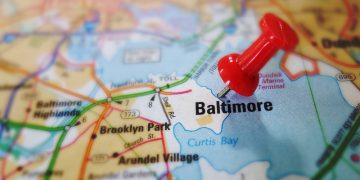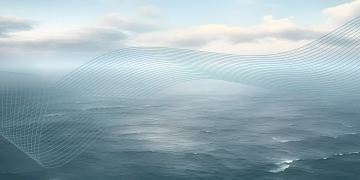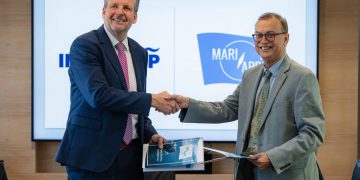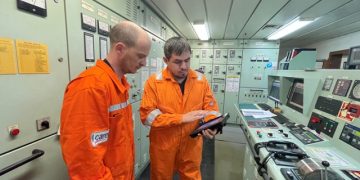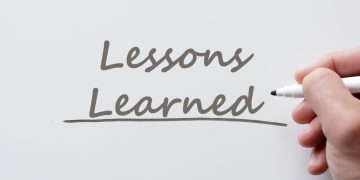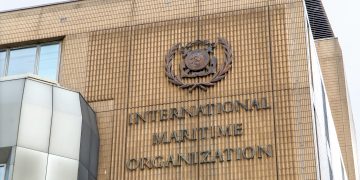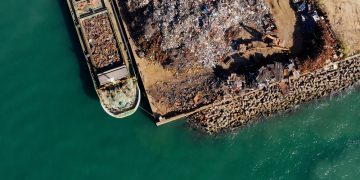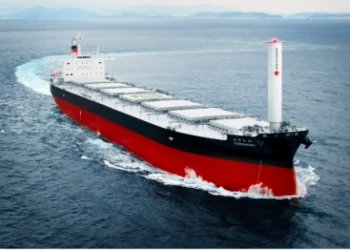According to UNCTAD, the maritime industry is a complex ecosystem that includes various value chains that require efforts by all stakeholders. However, three value chains are central to steering the sector’s decarbonization actions.
#1 The fuel chain
The well-to-wake marine fuel value chain encompasses exploration, transportation, processing, transportation of fuel to the fuelling spots and consumption by the ship operator.
These are interdependent components that need to be functional simultaneously to avoid bottlenecks and shortages of equipment or fuels
Nevertheless, maritime operators do not have sufficient price-competitive alternative fuels options to commit to charter agreements that include a premium for next generation dual-fuel engines.
[smlsubform prepend=”GET THE SAFETY4SEA IN YOUR INBOX!” showname=false emailtxt=”” emailholder=”Enter your email address” showsubmit=true submittxt=”Submit” jsthanks=false thankyou=”Thank you for subscribing to our mailing list”]
Some shipbuilders and engine manufacturers have responded by building ships with engines that can operate on methanol and fuel oil, or on LNG and fuel oil. Today, because of the lack of alternative and cost-equivalent low-carbon / zero-emissions fuels, ships equipped with dual-fuel engines run primarily on conventional fuel oil.
A wide range of low-carbon / zero-emission fuel is under development, such as green LNG, green methanol, green ammonia, and green hydrogen, but they have different timelines of availability on the market.
#2 The shipbuilding chain
The key shipbuilding value steps are ship design, procurement of construction materials, ship assembly, post-production maintenance, refitting, and end-of-life recycling. All phases need to address decarbonization., with ships designed for minimal GHG emissions.
In addition, what kind of ships will be ordered, built, and retrofitted depends on which fuels and engines will be available to meet the goals of ship owners, ship operators and regulations.
Moreover, reducing uncertainties that drive hesitancy regarding investments into decarbonization requires incentives and financing mechanisms. For this reason, UNCTAD notes that market-based measures such as carbon pricing can motivate a new era of shipbuilding that accelerates the transition to a low-carbon and zero emissions maritime sector.
#3 The operations chain
The maritime operational value chain covers the steps of ships being operational in their activities of travelling between ports and making port visits.
Ship operators have multiple levers to reduce CO2 emissions, including leveraging size and speed of ships and fleets, demanding hydrodynamic designs and dual-fuel engines or ships (partially) powered by biodiesel and electricity.
This obviously applies to ships, but seaports are also a crucial part of the operational chain. Ports need to support, and have the possibility to accelerate, decarbonization in shipping through infrastructure for storing and bunkering of alternative fuels and onshore power supplies
One key enabler that cuts across all three maritime value chains is the availability of alternative fuel at market compatible prices. As an output of the marine fuel value chain, alternative fuels determine ship design, engines, and tanks, and ship operations.
Increasing collaboration
As UNCTAD says, “the maritime industry is a self-organized ecosystem (SOE) of many independent entities that cooperate as needed to achieve a common goal.”
In order for these collaborations to work efficiently, UNCTAD recommends three steps to ensure collaborative innovation to decarbonize the global maritime ecosystem.
Step #1: Initiating collaborative innovation
A common object of interest that unifies engagement across the ecosystem’s members is urgently needed to redress today’s increasingly fragmented world. This requires incentives to engage the major stakeholders, a high degree of transparency to ensure fair engagement, a self-regulating mechanism to reduce self-interested actions detrimental to others or the community, and financially commensurate penalties for non-compliance.
Step #2: Establish regulatory alignment
Regulators have the power and the mission to push the industry in new directions that benefit citizens. At the same time, this power must be wielded while keeping in mind the needs of the private sector.
Regulators and corporate leaders should jointly promote new international policies for global regulatory convergence / harmonisation to ensure favorable conditions for the global shipping industry
stated UNCTAD.
Step #3: Leverage technology
Decarbonization will rely heavily on green fuels, with digital technology playing a contributory role to raise energy efficiency. Lately, the uptake of digital innovations within the maritime sector has accelerated, such as the emerging discourse on maritime informatics and maritime information technology and systems.




